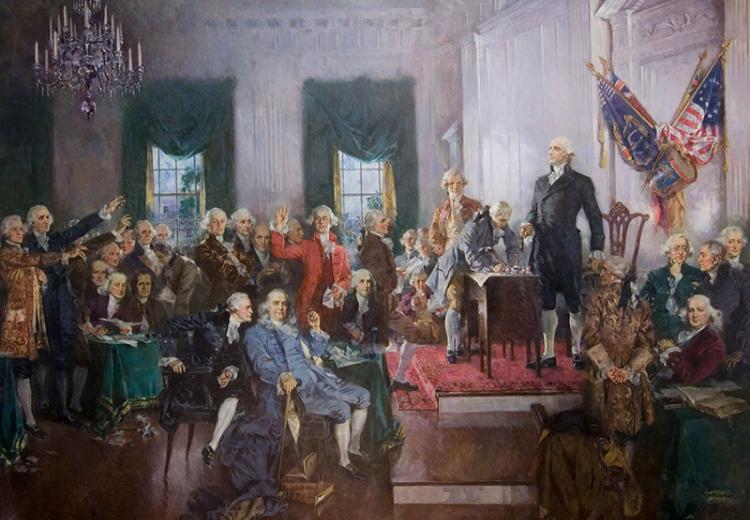Lesson 3: Creating the Office of the Presidency

Howard Chandler Christy's painting of the signing of the United States Constitution.
As the delegates at the Philadelphia Convention of 1787 continued to develop a plan of government that would remedy the defects of the Articles of Confederation, one of the most difficult challenges was creating the office of the presidency. All of the delegates agreed that some kind of executive office was necessary. Some delegates, however, recalled the recent tyranny of the English King and were hesitant to create an independent executive that might abuse its powers in like manner. Another group of delegates believed that an energetic and independent executive was necessary if the national government was to fulfill its responsibilities of promoting the security and stability of the Union. The debates between these two groups focused on several questions: What kinds of powers should the president have? What kinds of controls ought to be in place that would prevent the executive from abusing its powers, but still allow it to act with energy, speed and decision? How should the president be selected, and what length of term is appropriate? Should the president be eligible to run for re-election? Should the president be impeachable? The delegates debated these questions throughout the summer of 1787 and only reached a final agreement near the closing days of the Convention.
This lesson will focus on the arguments over the various characteristics and powers of the office of president as debated during the Constitutional Convention of 1787. By examining the views of delegates as recorded in James Madison's Notes of Debates in the Federal Convention of 1787, students will understand the arguments of those who supported either a strong, independent executive, or a very limited and highly controlled executive. Students will also see why, in the end, the delegates compromised on this question in order to fulfill their task of remedying the political flaws of the Articles of Confederation.
Guiding Questions
Why was creating the office of the presidency such an important and difficult task for the delegates at the Constitutional Convention of 1787?
Learning Objectives
Identify key delegates to the Constitutional Convention of 1787 and their views concerning the following aspects of the office of the presidency: 1. single or plural executive; 2. mode of election; 3. length of term; 4. eligibility for re-election; 5. impeachment; 6. veto power; 7. treaty-making power; and 8. appointment power.
Understand and discuss the proposals for the office of the presidency in the Virginia Plan, the New Jersey Plan, and the Hamilton Plan, and how these differed from but contributed to the office of the presidency as established by the U.S. Constitution.
Articulate how the debates over the office of the presidency often revolved around the American rejection of monarchy.
Understand the significance of the Brearly Committee's recommendations in resolving disagreements over the office of the presidency.
Explain the tension between the need to give the president sufficient "energy" (i.e., power and independence) and at the same time establish sufficient limitations and controls to prevent the abuse of executive power.
